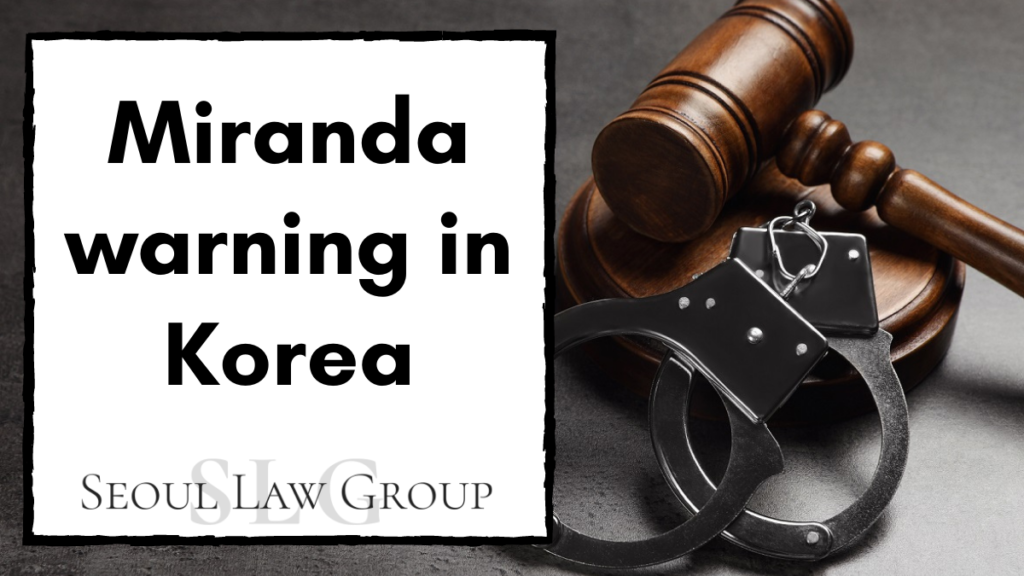If you are from American culture, or at least watched plenty of American movies and TV shows, you can easily imagine what happens when a police officer arrests a criminal. The police grab them and put handcuffs on their wrists, reciting a phrase something like this:
“You have the right to remain silent. Anything you say can be used against you in court. You have the right to have a lawyer with you during questioning. If you cannot afford a lawyer, one will be appointed for you if you wish.”
This is called “Miranda warning”, which name originated in United States Supreme Court case Miranda v. Arizona. This doesn’t exactly match the procedure of arrest in Korea, although we have one quite similar.

According to the Criminal Procedure Act, these are the list of things you should be told or shown when you are arrested by the prosecutor or police in Korea:
- Your warrant: The police should show you the warrant issued by the court (Article 85(1), Article 200-6), unless it’s an “emergency arrest” (= you committed a serious offence, and you are likely to escape or destroy evidence, so there’s seriously no time to wait for a warrant) or “arrest of flagrant offender” (= you are being caught red-handed) (Article 200-3, Article 212).
- The gist of the suspected crime: The police should tell you what you have done (to be exact, what they think you have done) to be arrested like this. For instance, “You are suspected of stealing a silver necklace from the jewelry shop last night at 9 PM.” (Article 200-5)
- The reason for arrest: The police should tell you what crime you are being charged with. For instance, “You are under arrest for a crime of larceny.” (Article 200-5)
- The right to appoint defense counsel: The police should tell you that you have a right to appoint a lawyer for yourself. (Article 200-5)
- The opportunity to vindicate yourself: The police should give you a chance to explain or defend yourself. For instance, “Hey, you’ve got a wrong person!” (Article 200-5)
Please not that all the above should be done in a language you can actually understand. If you don’t speak Korean, but the police speak to you in Korean so you can’t understand a word they say, you should inform them about this problem so that they would try another language or fetch the interpreter. You have a right to be told the things above in English or any other language you can understand.
Also, the police should notify someone about the fact that you are arrested. That “someone” would be your lawyer if you already have one, but if you don’t have a lawyer then it would be any person you pick. You can pick one of your family, friends, colleagues, or anyone you’d like. Then the police would notify that person that i) you are arrested, ii) when and where you are arrested, iii) why you are arrested, and iv) you have a right to appoint a lawyer (Article 87, Article 200-6).
You might be thinking something is missing here. What about the right to remain silent? Wasn’t that the main part of Miranda right?
Of course you have a right to remain silent, and the prosecutor or police should inform you of your right. But that would be informed not at the arrest, but just before the interrogation started. Let us see what it says on Criminal Procedure Act, Article 244-3(1):
Article 244-3 (Announcement of Right to Refuse to Make Statements and Other Rights)
(1) A public prosecutor or a judicial police officer shall inform a suspect of the following matters prior to interrogation.
-
-
- The suspect has a right to remain silent or make no statement for each question
- Remaining silent cannot be used against the suspect
- A statement made by the suspect by waiving the right to refuse to make a statement can be used as evidence for being guilty in the court
- The suspect has a right to have the assistance of defense counsel, including the counsel’s participation in interrogation.
-
Before interrogation, the prosecutor or police should inform you of the things above, and ask you whether you will exercise the right to remain silent and the right to have the assistance of a lawyer. You can answer either yes or no, then you should write down your answer with your own hand, so that it would be the evidence that they followed the proper protocol.

